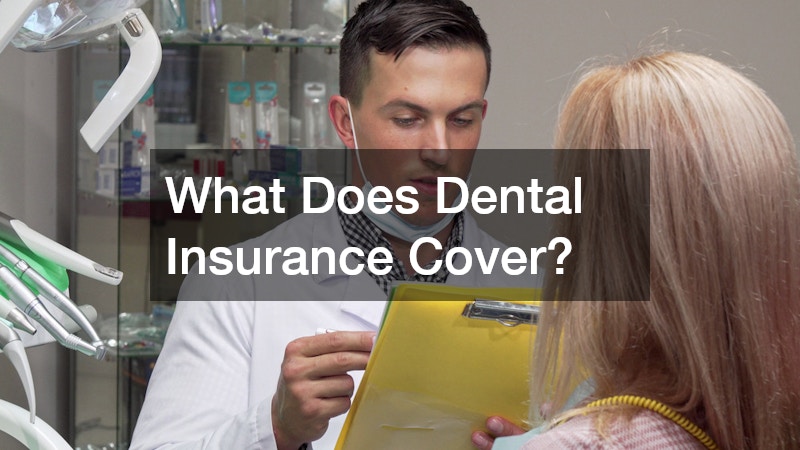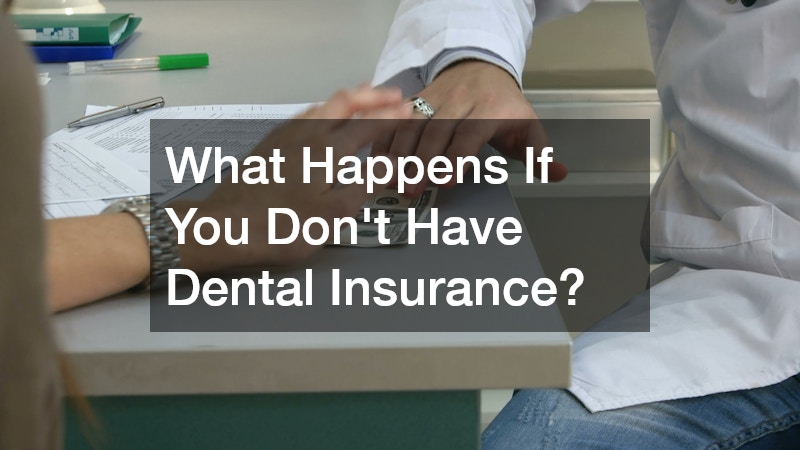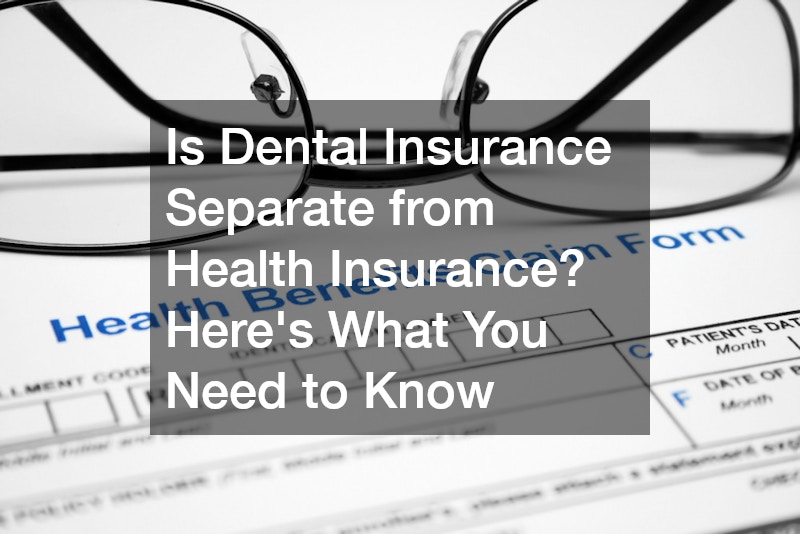
Let’s be honest—insurance can be super confusing, whether you’re 17, 27, or 57. If you’ve ever wondered, “Is dental insurance separate from health insurance?” you’re not alone. Understanding how insurance works is one of those important life skills that many people aren’t taught in school but will definitely need.
Whether you’re a student navigating campus health plans, a working adult comparing job benefits, or a parent shopping for coverage for your family, this guide is for you. We’ll break down what health insurance and dental insurance each cover, why they’re often separate, what your options are, and how to pick the best dental plan for your needs, without all the confusing legal jargon.
What Is Health Insurance, and What Does It Cover?
Health insurance is designed to help cover the costs of general medical care. It acts as a safety net when you’re sick, injured, or need preventive care like vaccinations. Most people get health insurance through an employer, the government (like Medicare or Medicaid), or the ACA marketplace.
Typical health insurance covers:
- Doctor visits (annual check-ups, specialists)
- Emergency room visits
- Hospital stays and surgeries
- Mental health and counseling services
- Prescription medications
- Preventive care (vaccines, screenings)
However, while health insurance is comprehensive in many ways, it doesn’t usually include dental care, and that’s where confusion often begins.
So, Is Dental Insurance Included in Health Insurance?
Short answer: Usually not.
Even though your teeth are an important part of your body, dental care is generally not included in standard health insurance policies. Unless you’re under a specific bundled plan (more on that later), dental coverage typically comes as a separate policy.
Why are they separate?
Historically, dental care was seen as a less essential part of healthcare, which led to the creation of a separate insurance system. Over time, this division became the norm in the insurance industry. Today, you often need to purchase dental insurance on its own or as an add-on to a health plan.
What Does Dental Insurance Cover?

Dental insurance helps cover the costs of maintaining your oral health—everything from routine cleanings to more involved procedures like fillings, extractions, and crowns.
Most dental plans cover:
- Preventive care (cleanings, exams, X-rays)
- Fillings and cavity treatment
- Tooth extractions
- Root canals
- Crowns and bridges (partially)
- Orthodontics (braces or aligners, often for children and teens)
Plans typically emphasize preventive care because catching issues early saves money and prevents bigger problems down the line.
How Much Does Dental Insurance Cost?
The cost of dental insurance depends on your age, location, and the type of plan. If you’re covered through an employer or family plan, your costs may be lower. If you’re buying individual coverage, here’s a general breakdown:
- Monthly premiums: $15–$50
- Annual maximums: $1,000–$2,000 (the most the plan will pay in a year)
- Deductibles: Often $50–$100 per year
- Copays or coinsurance: You may pay a portion of the cost for services like fillings, root canals, or crowns
Tip: Preventive services like cleanings are usually 100% covered under most plans.
Why Dental Health Matters More Than You Think
You might think, “I’ll just go to the dentist when something hurts.” But waiting until there’s a problem can lead to much more expensive (and painful) treatments down the line. Good oral hygiene isn’t just about avoiding cavities—it’s closely tied to your overall health and quality of life, no matter your age.
Poor oral health has been linked to:
- Heart disease
- Diabetes
- Chronic inflammation
- Low self-esteem
- Speech and chewing problems
- Pregnancy complications
- Respiratory infections in older adults
Your mouth is the gateway to the rest of your body. Infections in your gums and teeth can spread, impact other systems, and worsen existing health conditions. Oral pain can also interfere with sleep, work productivity, and nutrition, especially in children and seniors.
Regular dental visits aren’t just about clean teeth—they’re a vital part of overall wellness. Skipping them can lead to issues that affect your daily life, your confidence, and even your ability to eat or speak comfortably. With dental insurance, you’re more likely to catch issues early, when they’re easier and cheaper to treat.
Can Teens, Adults, and Seniors Get Dental Insurance?
Absolutely! Dental insurance is available for every age group. Here’s how it typically works by age:
Teens and young adults (under 26)
- Stay on a parent’s plan if available
- Enroll in school/university dental plans
- Purchase individual plans or discount programs
Adults (26–64)
- Access employer-provided plans
- Buy individual or family plans through the marketplace
- Look into bundled health and dental packages
Seniors (65+)
- Medicare doesn’t usually cover dental, but standalone plans are available
- Consider dental discount plans or Medicare Advantage plans with dental benefits
No matter your stage of life, there’s a plan that can work for your needs and budget.
What Happens If You Don’t Have Dental Insurance?

Without dental insurance, you’re responsible for paying 100% of dental costs out of pocket. Here’s what you can expect to pay:
- Cleanings: $75–$200
- Fillings: $150–$300
- Root canals: $800–$1,500
- Crowns: $1,000+
- Braces: $3,000–$7,000
If you’re uninsured:
- Visit dental schools for lower-cost services
- Look into community clinics or nonprofit dental programs
- Use teledentistry for basic advice or second opinions
- Prioritize daily hygiene (brushing, flossing, mouthwash)
Staying proactive about dental care helps avoid emergencies and surprise bills.
Are There Dental Plans That Combine with Health Insurance?
Sometimes, yes.
While health and dental insurance are usually sold separately, there are cases where they can be bundled, especially through employers or the ACA marketplace. Bundled plans can be more convenient and sometimes more affordable, as they reduce the need to manage multiple policies and payment schedules.
Common bundled plan options:
- Employer-sponsored plans: Some employers offer bundled health, vision, and dental coverage
- Marketplace plans (ACA): Dental add-ons are available in some states, especially for families with children
- Medicaid/CHIP: For those who qualify, dental coverage is often included for children and sometimes adults
You might also find dental riders or supplemental coverage options through private insurers. If you’re shopping on your own, be sure to read the plan details carefully. Some “combined” plans only include emergency dental care, not routine cleanings or orthodontics. Always double-check what’s actually covered, and don’t assume a bundled plan means full dental benefits.
How to Choose the Right Dental Insurance Plan

Choosing the right plan depends on your age, needs, and budget. Someone in their 20s with great teeth might only need cleanings and X-rays, while someone in their 50s might need coverage for crowns or gum disease treatment.
Key things to consider:
- Monthly premium vs. benefits: Don’t overpay for features you don’t need
- In-network dentists: Choose a plan that includes your current provider
- Annual maximums: Know your coverage limit each year
- Coverage levels: Understand what’s fully covered and what’s partially reimbursed
- Orthodontics: If you or a child needs braces or aligners, confirm it’s included
- Waiting periods: Some services aren’t available right away after enrollment
Compare at least 2–3 plans and don’t hesitate to ask your dentist which ones they accept.
What to Do If You Can’t Afford Dental Insurance
Dental care is important, but not everyone can afford dental insurance. If you’re struggling to pay for coverage, there are still options to help you maintain good oral health.
- Discount dental plans: While not insurance, these plans offer reduced rates on services for a monthly fee.
- Community health clinics: Many areas have clinics that offer low-cost dental care.
- Dental schools: Students in dental programs often provide services at reduced rates, supervised by experienced instructors.
- Payment plans: Some dental health experts offer financing options to make treatments more affordable.
Even without insurance, being proactive about prevention can save you money in the long run.
FAQs: Common Questions About Dental and Health Insurance
1. Can I see a dentist without insurance?
Yes, but it will be more expensive. Look for dental schools or local clinics offering affordable care.
2. Is dental insurance worth it?
If you only need routine cleanings, you might break even. But for anything more—like cavities, crowns, or braces—it can save you hundreds to thousands.
3. Can I get dental insurance at any time?
Not always. Some plans have open enrollment periods, while others let you sign up year-round.
4. Do I need dental insurance if I have Medicare?
Yes. Original Medicare doesn’t cover dental, but you can buy standalone plans or get Medicare Advantage with dental coverage.
5. Is there a plan that covers my whole family?
Yes! Many insurers offer family dental plans that provide coverage for adults and children under one premium.
Final Thoughts: What You Need to Remember
- Dental and health insurance are usually separate, but they both play key roles in keeping you healthy
- Dental plans focus on teeth and gums, with an emphasis on prevention
- Coverage is available for all ages, from children to seniors
- Being uninsured doesn’t mean you’re without options, but it does mean more out-of-pocket responsibility
- Prevention is cheaper than treatment, and regular dental visits help avoid bigger issues
Whether you’re a student, working adult, parent, or retiree, understanding how dental insurance works empowers you to make smart financial and health decisions. Investing in your oral health today can save you money and pain tomorrow.
